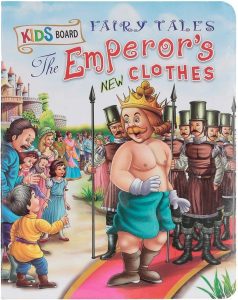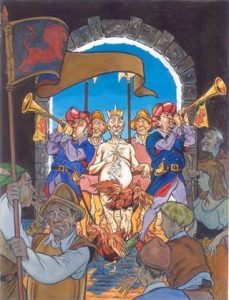The Role of the Church, Conforming to the World, and The Emperor’s New Clothes

The Role of the Church, Conforming to the World, and The Emperor’s New Clothes
by Bishop Philaretos
The role of the Church has always been to raise the person up to the heights of salvation. The Church isn’t a social club that lowers itself to suit the times. Christ tells us, “Be ye therefore perfect, even as your Father which is in heaven is perfect” (Matthew 5:48). He also instructs us to keep His word until the end of times saying, ” For truly, I say to you, until heaven and earth pass away, not an iota, not a dot, will pass from the Law until all is accomplished. ” (Matthew 5:18).
We are called by Christ to be separate from the “world”. To have different ideas from those of worldly people who don’t try to conform their lives to the Gospel’s message. In the 17th chapter of the Gospel according to St. John (part of the so-called “Gospel of the Covenant”) we read what Christ asks for His followers as opposed to what the “world” desires.
6 “I have revealed you to those whom you gave me out of the world. They were yours; you gave them to me and they have obeyed your word. 7 Now they know that everything you have given me comes from you. 8 For I gave them the words you gave me and they accepted them. They knew with certainty that I came from you, and they believed that you sent me. 9 I pray for them. I am not praying for the world, but for those, you have given me, for they are yours. 10 All I have is yours, and all you have is mine. And glory has come to me through them. 11 I will remain in the world no longer, but they are still in the world, and I am coming to you. Holy Father, protect them by the power of[ your name, the name you gave me, so that they may be one as we are one. 12 While I was with them, I protected them and kept them safe by[ that name you gave me. None has been lost except the one doomed to destruction so that Scripture would be fulfilled.
13 “I am coming to you now, but I say these things while I am still in the world, so that they may have the full measure of my joy within them. 14 I have given them your word and the world has hated them, for they are not of the world any more than I am of the world. 15 My prayer is not that you take them out of the world but that you protect them from the evil one. 16 They are not of the world, even as I am not of it. 17 Sanctify them by the truth; your word is truth. 18 As you sent me into the world, I have sent them into the world.
We are called to have “the words that Christ gave us” and the Holy Apostles accepted. Christ assures us that we will be hated by the world. We are sent into the world to transform it, not to be transformed by it!
I’d like to use a literary work to display the sad state of “Church” people hiding the truth and people following them in order “to be acceptable”. Hans Christian Andersen wrote a short story known as “The Emperor’s New Clothes”. I will first present the story in its totality and then attempt to explain its meaning in regards to the so-called “Orthodox” hierarchy of these times.
 THE EMPEROR’S NEW CLOTHES
THE EMPEROR’S NEW CLOTHES
Many years ago there was an Emperor so exceedingly fond of new clothes that he spent all his money on being well dressed. He cared nothing about reviewing his soldiers, going to the theatre, or going for a ride in his carriage, except to show off his new clothes. He had a coat for every hour of the day, and instead of saying, as one might, about any other ruler, “The King’s in council,” here they always said. “The Emperor’s in his dressing room.”
In the great city where he lived, life was always gay. Every day many strangers came to town, and among them one day came two swindlers. They let it be known they were weavers, and they said they could weave the most magnificent fabrics imaginable. Not only were their colors and patterns uncommonly fine, but clothes made of this cloth had a wonderful way of becoming invisible to anyone who was unfit for his office, or who was unusually stupid.
“Those would be just the clothes for me,” thought the Emperor. “If I wore them I would be able to discover which men in my empire are unfit for their posts. And I could tell the wise men from the fools. Yes, I certainly must get some of the stuff woven for me right away.” He paid the two swindlers a large sum of money to start work at once.
They set up two looms and pretended to weave, though there was nothing on the looms. All the finest silk and the purest old thread which they demanded went into their traveling bags, while they worked the empty looms far into the night.
“I’d like to know how those weavers are getting on with the cloth,” the Emperor thought, but he felt slightly uncomfortable when he remembered that those who were unfit for their position would not be able to see the fabric. It couldn’t have been that he doubted himself, yet he thought he’d rather send someone else to see how things were going. The whole town knew about the cloth’s peculiar power, and all were impatient to find out how stupid their neighbors were.
“I’ll send my honest old minister to the weavers,” the Emperor decided. “He’ll be the best one to tell me how the material looks, for he’s a sensible man and no one does his duty better.”
So the honest old minister went to the room where the two swindlers sat working away at their empty looms.
“Heaven help me,” he thought as his eyes flew wide open, “I can’t see anything at all”. But he did not say so.
Both the swindlers begged him to be so kind as to come near to approve the excellent pattern, the beautiful colors. They pointed to the empty looms, and the poor old minister stared as hard as he dared. He couldn’t see anything, because there was nothing to see. “Heaven have mercy,” he thought. “Can it be that I’m a fool? I’d have never guessed it, and not a soul must know. Am I unfit to be the minister? It would never do to let on that I can’t see the cloth.”
“Don’t hesitate to tell us what you think of it,” said one of the weavers.
“Oh, it’s beautiful -it’s enchanting.” The old minister peered through his spectacles. “Such a pattern, what colors!” I’ll be sure to tell the Emperor how delighted I am with it.”
“We’re pleased to hear that,” the swindlers said. They proceeded to name all the colors and to explain the intricate pattern. The old minister paid the closest attention so that he could tell it all to the Emperor. And so he did.
The swindlers at once asked for more money, more silk and gold thread, to get on with the weaving. But it all went into their pockets. Not a thread went into the looms, though they worked at their weaving as hard as ever.
The Emperor presently sent another trustworthy official to see how the work progressed and how soon it would be ready. The same thing happened to him that had happened to the minister. He looked and he looked, but as there was nothing to see in the looms he couldn’t see anything.
“Isn’t it a beautiful piece of goods?” the swindlers asked him, as they displayed and described their imaginary pattern.
“I know I’m not stupid,” the man thought, “so it must be that I’m unworthy of my good office. That’s strange. I mustn’t let anyone find it out, though.” So he praised the material he did not see. He declared he was delighted with the beautiful colors and the exquisite pattern. To the Emperor, he said, “It held me spellbound.”
All the town was talking of this splendid cloth, and the Emperor wanted to see it for himself while it was still in the looms. Attended by a band of chosen men, among whom were his two old trusted officials-the ones who had been to the weavers-he set out to see the two swindlers. He found them weaving with might and main, but without a thread in their looms.
“Magnificent,” said the two officials already duped. “Just look, Your Majesty, what colors! What a design!” They pointed to the empty looms, each supposing that the others could see the stuff.
“What’s this?” thought the Emperor. “I can’t see anything. This is terrible!
Am I a fool? Am I unfit to be the Emperor? What a thing to happen to me of all people! – Oh! It’s very pretty,” he said. “It has my highest approval.” And he nodded approbation at the empty loom. Nothing could make him say that he couldn’t see anything.
His whole retinue stared and stared. One saw no more than another, but they all joined the Emperor in exclaiming, “Oh! It’s very pretty,” and they advised him to wear clothes made of this wonderful cloth especially for the great procession he was soon to lead. “Magnificent! Excellent! Unsurpassed!” were bandied from mouth to mouth, and everyone did his best to seem well pleased. The Emperor gave each of the swindlers a cross to wear in his buttonhole, and the title of “Sir Weaver.”
Before the procession the swindlers sat up all night and burned more than six candles, to show how busy they were finishing the Emperor’s new clothes. They pretended to take the cloth off the loom. They made cuts in the air with huge scissors. And at last they said, “Now the Emperor’s new clothes are ready for him.”
Then the Emperor himself came with his noblest noblemen, and the swindlers each raised an arm as if they were holding something. They said, “These are the trousers, here’s the coat, and this is the mantle,” naming each garment. “All of them are as light as a spider web. One would almost think he had nothing on, but that’s what makes them so fine.”
“Exactly,” all the noblemen agreed, though they could see nothing, for there was nothing to see.
“If Your Imperial Majesty will condescend to take your clothes off,” said the swindlers, “we will help you on with your new ones here in front of the long mirror.”
The Emperor undressed, and the swindlers pretended to put his new clothes on him, one garment after another. They took him around the waist and seemed to be fastening something – that was his train-as the Emperor turned round and round before the looking glass.
“How well Your Majesty’s new clothes look. Aren’t they becoming!” He heard on all sides, “That pattern, so perfect! Those colors, so suitable! It is a magnificent outfit.”
Then the minister of public processions announced: “Your Majesty’s canopy is waiting outside.”
“Well, I’m supposed to be ready,” the Emperor said and turned again for one last look in the mirror. “It is a remarkable fit, isn’t it?” He seemed to regard his costume with the greatest interest.
The noblemen who were to carry his train stooped low and reached for the floor as if they were picking up his mantle. Then they pretended to lift and hold it high. They didn’t dare admit they had nothing to hold.
So off went the Emperor in procession under his splendid canopy. Everyone in the streets and the windows said, “Oh, how fine are the Emperor’s new clothes! Don’t they fit him to perfection? And see his long train!” Nobody would confess that he couldn’t see anything, for that would prove him either unfit for his position, or a fool. No costume the Emperor had worn before was ever such a complete success.
“But he hasn’t got anything on,” a little child said.
“Did you ever hear such innocent prattle?” said its father. And one person whispered to another what the child had said, “He hasn’t anything on. A child says he hasn’t anything on.”
“But he hasn’t got anything on!” the whole town cried out at last.
The Emperor shivered, for he suspected they were right. But he thought, “This procession has got to go on.” So he walked more proudly than ever, as his noblemen held high the train that wasn’t there at all.
A child generally doesn’t understand the use of maintaining pretense. Christ exhorts us in the Gospel to become like children in order to inherit the Kingdom of God. The people of the court in the tale are devoted to intellectual vanity and to appearing “acceptable”. They don’t want to be considered “stupid” so they pretend to see the new clothes.
The Emperor realizes that what the child says is true but he won’t back off because he has set up his own little world based on a lie. He has paid a price for those “clothes” and he will parade around in them. Big patriarchs and church leaders of our times realize that they aren’t walking the line of Orthodoxy, but as long as some many people are following and praising the “new clothes” who cares?! The unwillingness of the Christian fold to challenge the falling away of their “World Orthodox” leaders makes it difficult for others to go against popular opinion. The same is true for the newly professed “saints of propaganda”. People are forced to believe in things that are praised in circles and on the internet. When the bishops who had signed the Union of Ferrara-Florence returned to their flocks, they were met with the disapproval of the truly Orthodox in spirit people. How different are things today!








